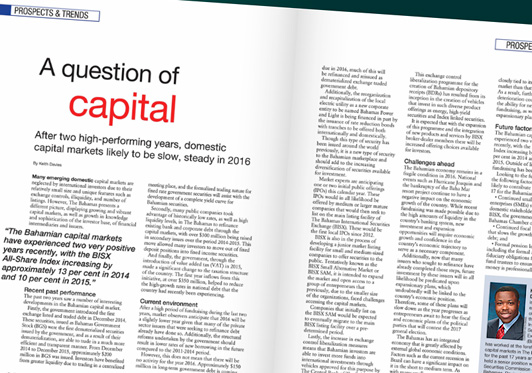| Published: Date: Updated: Author: |
The Bahamas Investor Magazine July 28, 2016 July 28, 2016 Keith Davies |
Many emerging domestic capital markets are neglected by international investors due to their relatively small size and unique features such as exchange controls, illiquidity, and number of listings. However, The Bahamas presents a different picture, displaying growing and vibrant capital markets, as well as growth in knowledge and sophistication of the investor base, of financial intermediaries and issuers.
Recent past performance
The past two years saw a number of interesting developments in the Bahamian capital market.
Firstly, the government introduced the first exchange listed and traded debt in December 2014. These securities, issued as Bahamas Government Stock (BGS) were the first dematerialized securities issued by the government, and as a result of their dematerialization, are able to trade in a much more efficient and transparent manner. From December 2014 to December 2015, approximately $200 million in BGS was issued. Investors have benefited from greater liquidity due to trading in a centralized meeting place, and the formalized trading nature for fixed rate government securities will assist with the development of a complete yield curve for Bahamian securities.
Secondly, many public companies took advantage of historically low rates, as well as high liquidity levels, in The Bahamas to refinance existing bank and corporate debt through the capital markets, with over $300 million being raised in secondary issues over the period 2014-2015. This move allowed many investors to move out of fixed deposit positions into fixed income securities.
And finally, the government, through the introduction of value added tax (VAT) in 2015, made a significant change to the taxation structure of the country. The first year inflows from this initiative, at over $350 million, helped to reduce the high-growth rates in national debt that the country had recently been experiencing.
Current environment
After a high period of fundraising during the last two years, market observers anticipate that 2016 will be a slightly lower year given that many of the private sector issuers that were seeking to refinance debt already have done so. Additionally, the structural reforms undertaken by the government should result in lower rates of new borrowing in the future compared to the 2011-2014 period.
However, this does not mean that there will be no activity for the year 2016. Approximately $150 million in long-term government debt is coming due in 2016, much of this will be refinanced and reissued as dematerialized exchange traded government debt.
Additionally, the reorganization and recapitalization of the local electric utility as a new corporate entity to be named Bahamas Power and Light is being financed in part by the issuance of rate reduction bonds with tranches to be offered both internationally and domestically.
Though this type of security has been issued around the world previously, it is a new type of security to the Bahamian marketplace and should add to the increasing diversification of securities available for investment.
Market experts are anticipating one or two initial public offerings (IPOs) this calendar year. These IPOs would in all likelihood be offered by medium or larger mature companies that would then seek to list on the main listing facility of The Bahamas International Securities Exchange (BISX). These would be the first local IPOs since 2012.
BISX is also in the process of developing a junior market listing facility for small and medium-sized companies to offer securities to the public. Tentatively known as the BISX Small Alternative Market or BISX SAM, it is intended to expand the market and open access to a group of entrepreneurs that previously, due to the smaller size of the organizations, faced challenges accessing the capital markets.
Companies that initially list on the BISX SAM would be expected to eventually migrate to the main BISX listing facility over a pre- determined period.
Lastly, the increase in exchange control liberalization measures means that Bahamian investors are able to invest more funds into international investments through vehicles approved for this purpose by The Central Bank of The Bahamas.
This exchange control liberalization programme for the creation of Bahamian depository receipts (BDRs) has resulted from its inception in the creation of vehicles that invest in such diverse product offerings as energy, high-yield securities and Index linked securities.
It is expected that with the expansion of this programme and the integration of new products and services by BISX broker-dealer members there will be increased offering choices available for investors.
Challenges ahead
The Bahamian economy remains in a fragile condition in 2016. National events such as Hurricane Joaquin and the bankruptcy of the Baha Mar resort project continue to have a negative impact on the economic growth of the country. While recent fundraising was made possible due to the high amounts of liquidity in the country’s banking system, new investment and expansion opportunities will require economic growth and confidence in the country’s economic trajectory to serve as a necessary component.
Additionally, now that many issuers who sought to refinance have already completed those steps, future investment by these issuers will in all likelihood be predicated upon expansionary plans, which undoubtedly will be linked to the country’s economic position. Therefore, some of these plans will slow down as the year progresses as entrepreneurs await to hear the fiscal and economic plans of the political parties that will contest the 2017 general election.
The Bahamas has an integrated economy that is greatly affected by external global economic conditions. Factors such as the current recession in Brazil can have a significant impact on it in the short to medium term. As with many smaller economies, the Bahamian economy is much more closely tied to its domestic capital market than that of larger economies. As a result, further economic deterioration could potentially limit the ability for new rounds of fundraising, as well as dampening expansionary plans.
Future factors
The Bahamian capital markets have experienced two very positive years recently, with the BISX All-Share Index increasing by approximately 13 per cent in 2014 and 10 per cent in 2015. Outside of listed companies, fundraising has been robust.
Looking to the future, we believe the following factors would be most likely to contribute to a positive 2016- 17 for the Bahamian capital market:
• Continued small and medium enterprises (SMEs) support by all domestic stakeholders including BISX, the government and the Bahamas Chamber of Commerce;
• Continued fiscal rebalancing that slows the growth of the national debt; and
• Formal pension legislation including the formal adoption of fiduciary obligations for pension fund trustees to ensure that this money is professionally managed.










